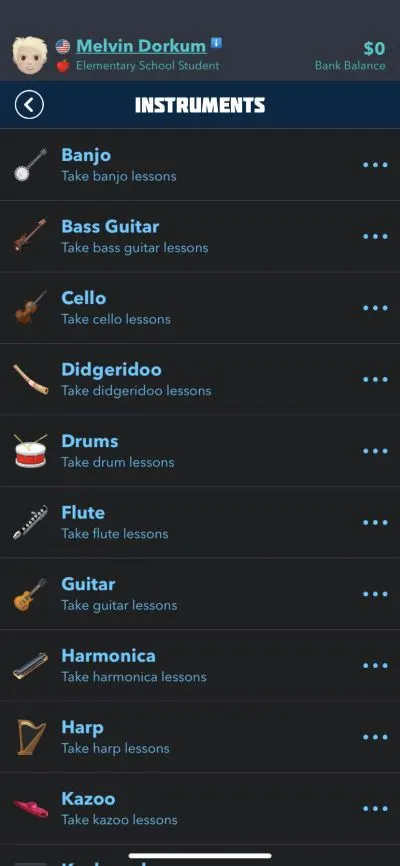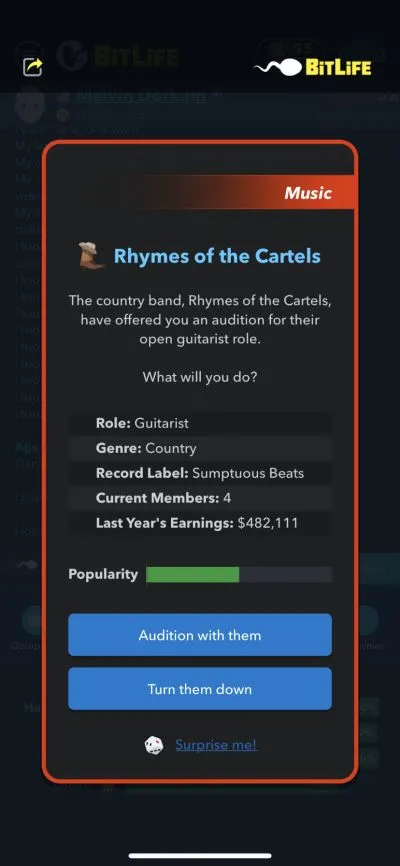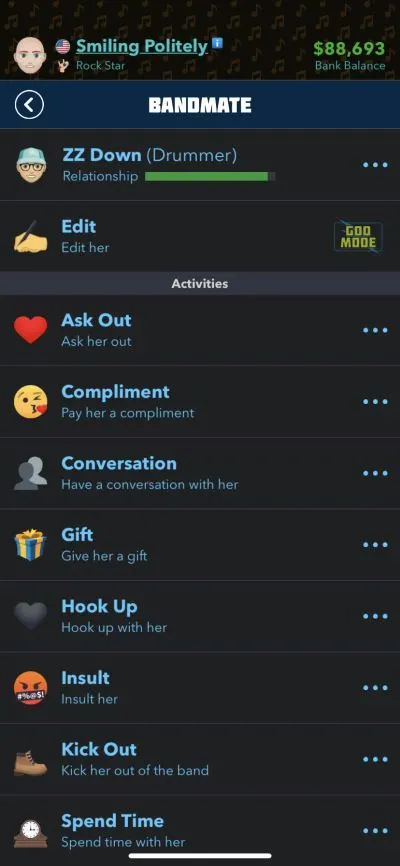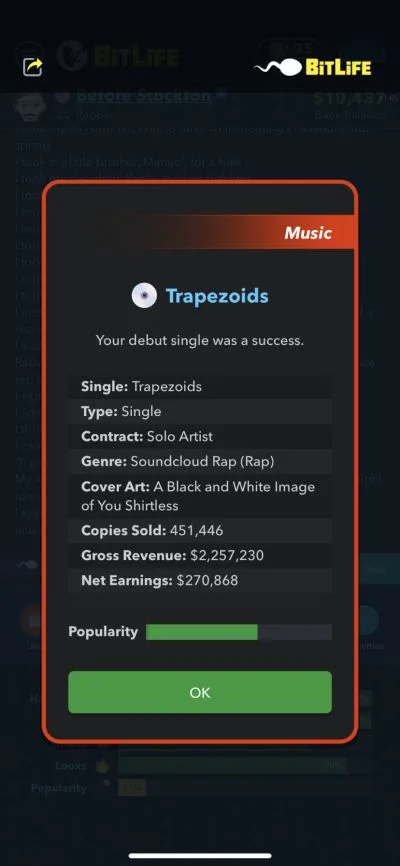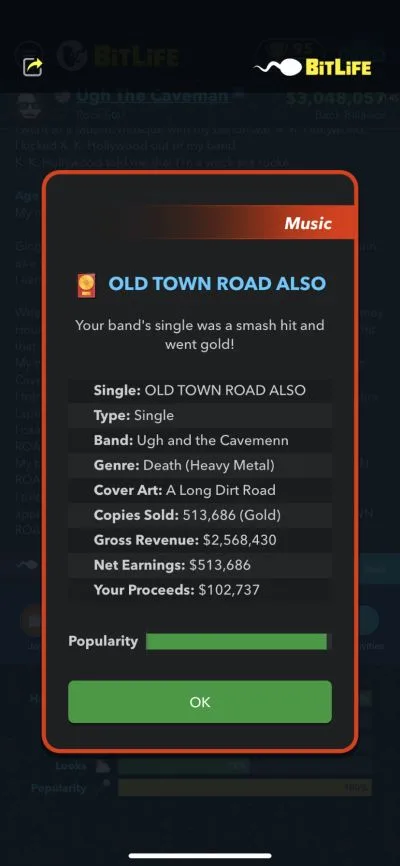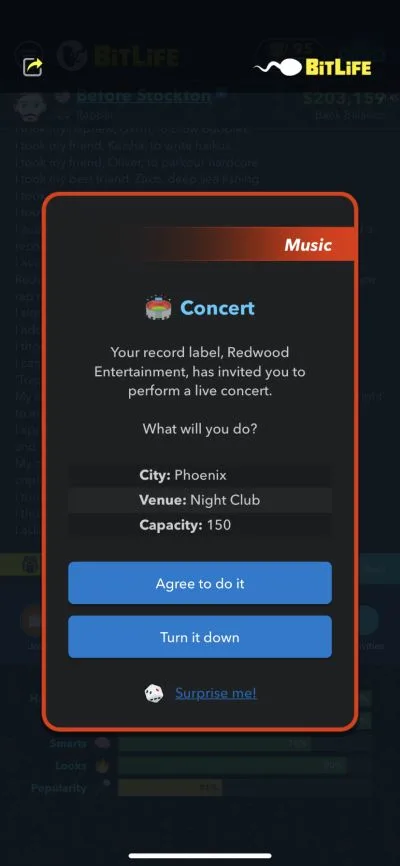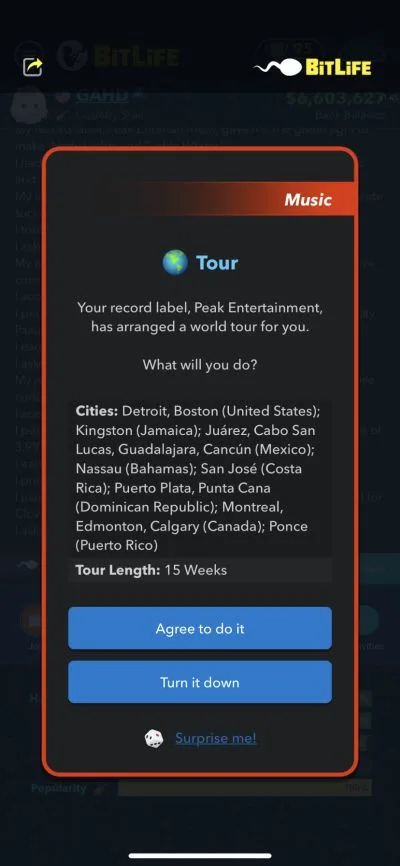Candywriter’s BitLife has gotten its fair share of updates since its release in September 2018, and the version you may have just downloaded, for sure is, is almost unrecognizable compared to the original edition that rolled out way back then. That’s because the company has kept rolling out new updates for both iOS and Android versions that don’t just squash bugs and improve stability but also add a plethora of new features. What could be next after the massive Pro Sports Update that allowed users to make super-athletes out of their Bitizens?
After more than two years of basic scenarios and a linear approach to stardom in the world of music, Candywriter has released an update that allows you to live out your rock ’n’ roll fantasy in more than one way, and with rock as just one of several genres represented! The all-new Pop Star Update (version 1.45) now lets you choose which instrument you want to master in childhood, whether to take vocal lessons or not, and whether you wish to join a band or become a solo artist once you reach adulthood.
But before you set off on your quest to create the next Beatles, Jimi Hendrix, One Direction, or Post Malone in the game’s fictional universe, we suggest you check out our latest BitLife strategy guide, which goes in-depth about all the new features included in the Pop Star Update and talks you through the things you need to do to become rich and famous in the world of music.
BitLife Pop Star Update Overview – Creating The Next Big Thing In Music
Prior to the arrival of BitLife’s Pop Star Update, musical stardom had become pretty much cut-and-dry for most players. Be born with good Looks, apply as a Background Vocalist out of high school or college, and work your way up the ranks until you become a Lead Singer and eventually become famous enough to star in commercials, pose for photoshoots, and the like.
That goes all out the window with the new update, though it is still strongly recommended that your character starts out with good Looks and remains attractive till the time comes to apply for a music-related job. If you have God Mode, however, you can choose which Special Talent you wish to be born with — Music or Sports. You’ll see that in the orange button right below your birth city, so make sure you choose Music if you’re a God Mode player trying to live your best life as the next big thing in music.
There are, however, some drawbacks to keep in mind at this point. While it isn’t unusual for athletes to enjoy second careers as musicians or for musicians to come from athletic backgrounds in high school or college, choosing Music as your Special Talent typically precludes you from being athletically gifted.
Conversely, if you choose Sports or None as your Special Talent, it will take you a long, long while to become good at the instrument of your choosing. That also applies if you don’t have God Mode, in which case newly created Bitizens will randomly come with Music or Sports talents, or none at all. In addition, it appears that with the introduction of Special Talents, Athleticism is now a hidden stat for user-controlled Bitizens.
Learn To Sing Or Play An Instrument At A Young Age
With that out of the way, the first thing you need to do once you’ve created a character and set their Special Talent to Music (if applicable) is to have them learn how to play musical instruments. This becomes an option once they reach the age of 6, and you can do this by going to the Activities menu, going to Mind and Body, and heading to Instruments. Once there, you can take lessons in a wide range of instruments, from the usual guitar, bass, and keyboards to classical instruments like violin and cello to different types of brass instruments to even less conventional ones, such as the recorder and the didgeridoo.
Bear in mind that it seems you can learn as many instruments as you could, provided your parents have high Generosity stats — otherwise, you may have to wait until you turn 18 if you have particularly stingy parents before learning how to play even one instrument! (God Mode, however, can easily take care of that.)
Interestingly, the option to take singing lessons is separate from the Instruments sub-menu, and you’ll have to scroll all the way to the bottom to start taking Voice lessons to improve your singing chops. This feature becomes available once you turn 8 years old, and you’ll also want to work on that if you want to widen your musical opportunities when the right time comes.
Just when is the “right time” when it comes to starting your musical career in BitLife? As we’ve noticed, you’re going to have to wait till you reach your 18th birthday before you can audition for a record company as a solo artist or join an existing band. Unfortunately, the game has yet to include a feature where you can do what many school kids do and form a band with friends, or possibly join if your siblings invite you to join their band.
But it’s still a good thing to know that you can now join other people’s bands in various roles or try your luck as a solo performer instead of simply rising from singing background vocals to fronting your group. Being well-versed in more than one instrument helps, and so does having the bar filled up as completely as possible — that, naturally, increases your chances of passing the audition instead of getting laughed out of it!
As a bonus tip, you can take multiple lessons per year for a given instrument (also applicable with voice lessons) and see a small improvement in your Skill after each of those lessons. And you can keep taking lessons as an adult, so it is entirely possible to become very proficient at any instrument or at singing at a rather advanced age, then go enter the music business if you feel like it! (Music lessons don’t come free, though — they cost $500 for voice lessons and $1,500 to learn an instrument once you reach adulthood.)
Breaking Into The Biz – Choose Your Genre And Instrument Wisely
Once you’ve become proficient enough at your chosen instrument (or at singing) and have reached the age of 18, you would be allowed to audition for one of the three available record label options as a solo artist or audition for a band that may have an available vacancy.
Although there seems to be some level of randomization when it comes to your performance in an audition, it will certainly help if your Skill at your chosen instrument or in singing is as close to 100 percent as possible. If the Skill bar isn’t completely filled up, record labels might not even consider letting you audition, especially if you’re trying your luck as a solo singer!
One thing we’ve noticed in our first few playthroughs since the Pop Star Update dropped is that once you’ve chosen a genre, either as a solo musician or as part of a band, that will be the genre for the rest of your career in most cases! Sadly, it doesn’t look like voluntary mid-career genre changes a la Gwen Stefani, Taylor Swift, or Machine Gun Kelly are in the cards at the moment, though that’s a feature we would certainly hope Candywriter adds in subsequent updates.
However, there is a way to work around this — you can walk out of your recording contract or choose not to re-sign once it expires if you’re a solo act or simply quit the band you currently play for, then re-audition for a label that wants you to sing a different genre (assuming they let you) or a band that plays a different genre.
The same applies to switching instruments — you cannot voluntarily ask to switch from drums to guitars or bass to lead vocals, for instance, while you are part of a band, and you cannot opt to play an instrument while in the middle of a contract as a solo singer, or vice versa. You’ll need to quit the band or be free of your solo contract if you want to make that instrument change.
Maintain A Good Relationship With Your Band
For those who choose to join a band, it is important to remain on good terms with your bandmates if you don’t want to get kicked out unceremoniously. Much like coworkers and classmates, you will see a similar menu for your band — just go to Job, tap on your occupation, then tap on Band in order to view your bandmates and see how your relationship is with each of them.
Tapping on individual members will reveal the usual options you may see when tapping on classmates or coworkers — just as usual, you can befriend them, compliment them, start a conversation, give them gifts, spend time doing an activity with them, ask them out, or hook up with them. Of course, you can also insult them if your Bitizen is that type of musician with an attitude problem, most likely the dreaded Lead Singer Disease we hear so much about. But the one unique option you’ll notice is the one where you can kick someone out of your band.
By tapping on Kick Out, you may opt to dismiss someone from your band for whatever reason you may have in mind, although there may be some random situations where the option to boot someone for one transgression or another may come up. Sometimes, you will be successful in kicking that person out, although there may be some consequences if they don’t take their dismissal likely — at the very least, they may insult you, and if they’re feeling especially salty, they may choose to attack you!
However, being that most bands take a democratic approach to such matters, you may be overruled by your bandmates, and that may affect your relationship with them — while also risking the possibility of getting insulted or attacked by the person you tried to fire.
There are different things that can affect your relationship with bandmates in a positive way — aside from the usual compliments, gifts, and conversations, dating a bandmate is a surefire way to get your relationship bar up to 100 percent. Generally speaking, a well-received concert tour, or album/single release will improve your relationship, while bad performances and poor-selling releases will affect it adversely.
Then there’s also the matter of changing your band name, which is something you should only do if your Relationship bar with the band in general is completely filled up. You may or may not like BitLife’s takes on popular real-life bands like the Red Hot Chili Peppers (Super Hot Ghost Peppers) or Black Sabbath (Dark Sabbath), but changing your band name right off the bat is an easy shortcut to getting kicked out before releasing a single or an album!
That all said, becoming friends with your bandmates is the most effective way of improving your general relationship — even if you choose to go solo or if the group disbands, you can remain on good terms with your former bandmates, and that’s more than what could be said about certain real-life musicians who used to be in the same band together!
Releasing Albums And Singles – How To Improve Your Chances Of Going Gold Or Platinum
Regardless whether you’d rather go solo or join a band, you will always have the option to release a full-length album or a single with the new BitLife Pop Star Update. When it comes to releasing albums, you can either choose Studio or Single, or if you have existing studio albums, you can make a live album of it, though we wonder why this is the case when most popular live albums are highlighted by an artist’s greatest hits.
You can then choose your album name, a sub-genre to focus on, the number of tracks, and the cover art — Candywriter being Candywriter, all of the selected album names we’ve seen are parodies of existing ones, while the cover art options play off all the various tropes musicians rely on when choosing an album cover. Releasing a single is pretty much the same with the option to choose a sub-genre and cover art, but this time, you need to come up with a song title or go with BitLife’s parodies of popular songs — or riffs on recent pop culture developments.
Not all of your releases will turn out to be successful, and that’s especially true if you join a band with their Popularity bar in red or orange territory. Sometimes, you’ll have no choice but to release a flop single or album as the newest member of the band. However, you can improve your chances of selling more records by maintaining a good relationship with your bandmates, as we suggested above, and performing well in your concerts and tours.
As a solo artist, it’s much easier — even if your Popularity is virtually nonexistent at first, you’ll have a good chance of doing well right out of the gate if your Skill level in your chosen instrument or on vocals is as close as possible to 100 percent.
In addition to all that, it’s usually a good idea to alternate between albums and singles from year to year, or even take a year off to focus on touring and/or individual concerts. In theory, this builds anticipation for your next major release instead of saturating your target audience with an album’s worth of new material year after year. It also helps to use the Practice option at least once a year to hone your chops, and to make smart decisions when those random scenarios pop up after hitting on the Age button — for example, you may have to choose whether to recognize your bandmate’s contributions to the album or not, or choose whether to show up drunk to your radio interview or sober up by drinking some coffee…or taking a pill.
Another thing that seemed to work for us was sticking to the same sub-genre for a few releases, then choosing another sub-genre later down the line. This allows you to strike the balance between releasing tried-and-tested songs and showing some evolution in your musical endeavors.
Furthermore, we should also add that album and single sales can add up as the years pass in the game, so if you don’t get any certification of any sort in the first year of release, don’t sweat it — assuming it was popular enough, there’s a good chance it will reach Gold status in the next year or two! (That also applies to albums initially certified Gold, as they just might reach Platinum in the years to come.)
Earn More Money By Performing More Concerts And Tours
As a famous musician in the BitLife universe, you will get the same perks you used to before the Pop Star Update rolled out — you can still release books, star in commercials, pose for sexy photoshoots, or appear on a late-night TV show, and you can get verified on social media and get paid for endorsing a wide variety of products. However, you will have access to an even bigger source of revenue, and you won’t have to do the old trick of quitting the game and restarting it in order to star in multiple commercials per year.
We are, of course, referring to Concerts and Tours, both of which are among the options for band members and solo musicians alike. Concerts are standalone events that may take place in a variety of venues, from tiny high school gyms and clubs to large stadiums, and we’ve observed that regardless of how popular you are, the size of the venue will always be random.
That means you may only end up with a few hundred dollars for that tiny little gig or possibly walk away a couple million dollars richer after playing a high-profile, sizable venue. You will, however, need to be fairly popular in order to get concert offers of any kind, so make sure to release something first if your Popularity bar is still red or orange!
Tours, on the other hand, are large-scale events where you — or you and your band — will play a series of concerts in different cities and countries. Sometimes, a tour may only include a handful of stopovers, but there may be times when your record company will be able to book a tour with close to 20 stopovers. This is a good way to earn millions of dollars in one go, but the Popularity threshold to be booked on a tour is substantially higher. Still, it’s a good way to pass the time in between album releases!
Although it’s fairly easy to perform well in concerts and tours alike, there is still some randomization involved, and if you and your bandmates aren’t on good terms with each other, that may possibly result in a poorly-received show or series of shows! The game won’t detail what goes down, but it’s safe to assume that you’ll be playing the equivalent of a concert or tour with multiple backstage bust-ups among band members, angry fans, and off-key performances from one or more members. And just to build on what we warned you above, a bad performance could negatively impact your relationship with your bandmates and your label! (Or if you’re a solo artist, only the latter.)
Going Solo, Quitting Your Band, And Walking Out On Your Contract
There comes a point in the existence of many a band when one of their members decides that they’re better off making music on their own terms and doing their own thing. So what should you do if you’re thinking you might be better off as the Justin Timberlake of your virtual version of NSYNC?
The sensible thing to do would be to choose the Quit or Solo Artist options, which are quite similar to each other on the surface but, at the end of the day, ultimately different. Simply quitting a band makes you a free agent, leaving you with the choice of auditioning for another band or auditioning for a label as a solo performer. However, if you choose Solo Artist, that means you will be switching from one label to another, with no guarantee that any of the other labels will be interested in your services.
This is the opposite of the Band option for solo artists, which allows you to find a band to team up with, regardless whether they’re on the same label as you are or not. Regardless of your choice, leaving your band via the Quit or Solo Artist option won’t have any impact on your relationship with your former bandmates — at least based on what we’ve observed in multiple playthroughs.
Now the one thing you should absolutely avoid doing is to leave your label in the lurch and walk out of your contract by choosing the Walk Out option. This only applies if you’re a solo musician, and if you bolt from your label while you’ve still got some time remaining on your deal, that will essentially turn you into a pariah in the BitLife universe’s music industry.
Even if you wait it out for a year, two years, or several years, none of the available record labels will want to sign you, though that won’t necessarily be the end of your career as a famous musician. You can still circumvent this by auditioning for a band, though if you choose to go solo afterward, chances are the labels will still treat you as if you’re yesterday’s news.
Other Features And Possibilities
At this point, we’ve discussed all the primary features or options in your musician sub-menu following the Pop Star Update, but there are still a few that we have yet to discuss in greater depth.
For solo artists and band members, the Discography serves as an equivalent of the Stats option for professional athletes where you can view your character’s statistics in each pro season. In Discography, you can view all your albums and singles, and by tapping on each of them, you will see some vital information on the release, including the type (single or album), the type of contract you were on, the number of years since release, the genre and cover art, and the most important numbers of all — copies sold, gross revenue, net earnings, and your proceeds from the release. This is a good way to see if your musical career is on the right track — while also looking back on the goofy (or not-so-goofy) titles you chose for your albums and singles!
We mentioned the Practice option earlier, and it is what it says it is — this allows you to work on your vocal or instrument skills ahead of a concert, tour, or album/single release. However, it’s also worth noting that this does not have any impact on your instrument or vocal skills, as seen in the Mind and Body menu.
Lastly, the Stage Name option at the very bottom of your musician menu also does just what it says it does — it allows you to choose a stage name that you can use in your career as a solo act or as a band member. There doesn’t appear to be any limit to the number of times you can change your stage name, and unlike legal name changes, going by a stage name isn’t something that could potentially upset your relatives.
Although we have yet to experience it, Candywriter did share a screenshot on Twitter showing that it’s possible for bands to disband for one reason or another — in that image, one of the band’s members fell in love with someone and wanted to move to her home country. In such scenarios, you will be asked whether you agree to break up or want to keep the band together. Be on the lookout for such random events, as similar things do happen in real life, albeit with less ludicrous circumstances!


